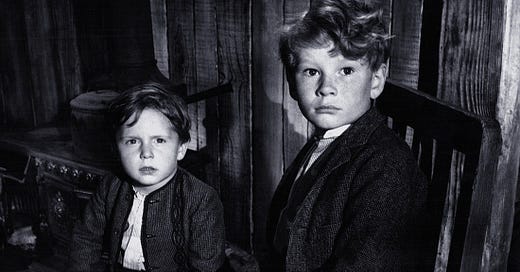Our Film of the Week comes from England and Scotland by way of our family’s most beloved of the Canadian provinces, Nova Scotia, and in Cape Breton, where we bought a small fishing cottage a long time ago. When our film is set, around the turn of the 1900’s, Cape Breton was a lot different from what it is now. There were three main things that people did for a living. There were the coal mines around the Sydney area, reaching far out under the sea. There were the fishing boats and the fisheries. And there were farms, because, after all, people do have to eat, and most of what they could get would have to be grown or produced locally. The Kidnappers is set on a farm, where live an old man, Jim Mackenzie (Duncan Macrae), his wife, and their grown daughter Kirsty (Adrienne Corri).
Jim is stubborn and, in his own opinion, righteous — self-righteous, you might say, but that would be to exaggerate. It would have been easy for the director, the writer, and Macrae himself to have made Jim a caricature, easy to pigeonhole, and not of much interest. But that is not what they do. He is a deeply human being, deeply flawed, but of considerable virtues. And in a way, he is an orphan, or at least he knows what orphanhood is, both in his heart and by what he must do for others. That is because he has lost his only son in the Boer War, and now, delivered across the vastness of Canada by train, his small grandsons Harry and Davey, true orphans, have come to live with him.
Where you have farms, and maybe it’s more likely when the land is not that great and the summers not that long, you will have arguments over who owns what. That is the thorn in MacKenzie’s side. He says he owns a nearby hill, and he will shoot at anybody who trespasses. The main fellow he has in mind is a displaced Dutchman, Hooft by name, who says he paid for legal title to the hill. The Dutchman is there because of the Boer War. That, of course, makes matters very touchy. To complicate things farther, the local doctor, Willem Bloem (played by Theodore Bikel, a man of many talents, and another favorite of ours), is also a Dutchman, and Kirsty is in love with him, though it seems he has committed himself to living out the rest of his days alone.
Most of the early Scots who settled in Cape Breton were from clans like the Campbells and the Stewarts and the MacDonalds, and they were largely Catholics, who had supported the quixotic dreams of Bonnie Prince Charlie, and who after the English put down that rebellion, found their own country an inhospitable place. But some Presbyterians also emigrated to Canada and Cape Breton, and Jim MacKenzie is of that stock. He can hardly read, but the one book he tries to puzzle out is the Bible, and of course he attends services on the Sabbath, without fail. And now two little boys have come to live with him, a tough old man on a marginal farm — a man who has only one pair of boots, which he never wears except to Sunday services and for special occasions; otherwise he tramps about barefoot.
What do you suppose the boys want most of all? What I’ve got right now leaning against my shoulder: they want a dog. But old Jim sees no use for it. Nor does he have the money. “You can’t eat a dog,” says he, and the littler of the two boys, Davey, only five years old, wonders aloud whether Grandpa would go ahead and try to do that anyway. The boys haven’t just gotten the idea out of their heads. They’ve seen an advertisement for setter puppies, selling at $13.50 each — actually, a good lot of money in those days, not that the boys understand it as such.
So the problems are laid out for us, and it’s to the great credit of the writers and the director that we really do not know how things are going to turn out. There is no love between MacKenzie and Hooft, and the ownership of that hill may end up being adjudicated by violence. Kirsty is younger than Dr. Bloem, and she hardly has any opportunity to speak to him. The boys are young enough to get into a lot of trouble. Old Jim isn’t one to spare the rod when the elder, Harry, who is still only eight years old, crosses him. Yet no one in the film is either wicked or stupid. They are what you and I would be, somehow or other, if we were in their shoes — or rather, if we were barefoot in their tracks.
I won’t give out any spoilers. The Kidnappers is one of the most honest and heartfelt films we have seen this year. And this one is for the whole family.
Please excuse any ads in our selections. When possible we try to find a free version for our readers, but we can’t always find them ad-free.





The 1990 remake starring Charlton Heston is really very good, too. And it was produced by Canadian Broadcasting Corp for the Disney Channel. Imagine.
Great review and (yay, yay, yay!!) when I used the "share" button to post on Facebook it actually brought up the post in preview instead of a subscribe link. Fabulous!!!! If that continues to be the case I shall be sharing far more frequently in future..